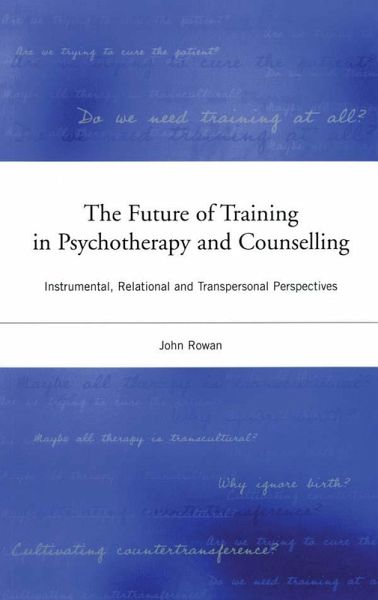
The Future of Training in Psychotherapy and Counselling (eBook, ePUB)
Instrumental, Relational and Transpersonal Perspectives
Versandkostenfrei!
Sofort per Download lieferbar
34,95 €
inkl. MwSt.
Weitere Ausgaben:

PAYBACK Punkte
17 °P sammeln!
The Future of Training in Psychotherapy and Counselling presents a revealing and stimulating account of the current state of training that demonstrates how training will have to adapt if it is to sucessfully meet the needs and challenges of the future.In an attempt to look afresh at the whole question of training, John Rowan proposes that there are three ways of doing therapy and any examination of training has to consider each of these:* the instrumental, where the main emphasis is on the treating the client or patient * the authentic way, where the main emphasis is on meeting the client or p...
The Future of Training in Psychotherapy and Counselling presents a revealing and stimulating account of the current state of training that demonstrates how training will have to adapt if it is to sucessfully meet the needs and challenges of the future.
In an attempt to look afresh at the whole question of training, John Rowan proposes that there are three ways of doing therapy and any examination of training has to consider each of these:
* the instrumental, where the main emphasis is on the treating the client or patient
* the authentic way, where the main emphasis is on meeting the client or patient
* the transpersonal way, where main emphasis is on linking with the client in a more personal way.
Each approach makes different assumptions about the self, about the relationship, and about the level of consciousness involved in doing therapy. By challenging the basic precepts of traditional training, John Rowan encourages the reader to reconsider subjects including the difference between counselling and psychotherapy, culture and ethics, the origins of disturbance in clients, and child development.
The Future of Training in Psychotherapy and Counselling provides a much needed new perspective that will compel all psychotherapists and counsellors to take a closer look at training in the field.
In an attempt to look afresh at the whole question of training, John Rowan proposes that there are three ways of doing therapy and any examination of training has to consider each of these:
* the instrumental, where the main emphasis is on the treating the client or patient
* the authentic way, where the main emphasis is on meeting the client or patient
* the transpersonal way, where main emphasis is on linking with the client in a more personal way.
Each approach makes different assumptions about the self, about the relationship, and about the level of consciousness involved in doing therapy. By challenging the basic precepts of traditional training, John Rowan encourages the reader to reconsider subjects including the difference between counselling and psychotherapy, culture and ethics, the origins of disturbance in clients, and child development.
The Future of Training in Psychotherapy and Counselling provides a much needed new perspective that will compel all psychotherapists and counsellors to take a closer look at training in the field.
Dieser Download kann aus rechtlichen Gründen nur mit Rechnungsadresse in A, B, BG, CY, CZ, D, DK, EW, E, FIN, F, GR, HR, H, IRL, I, LT, L, LR, M, NL, PL, P, R, S, SLO, SK ausgeliefert werden.













